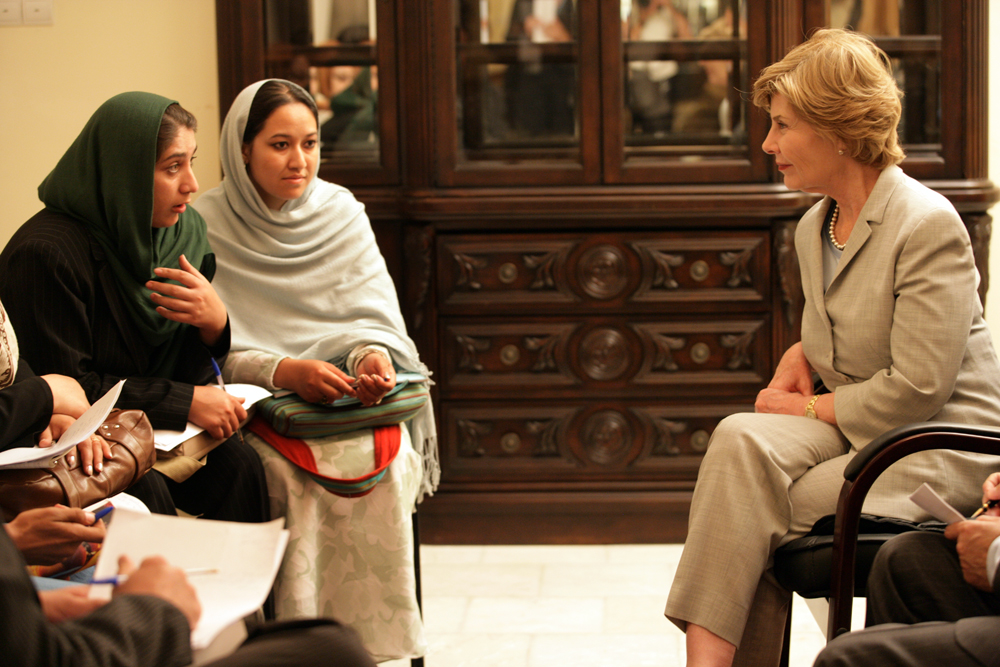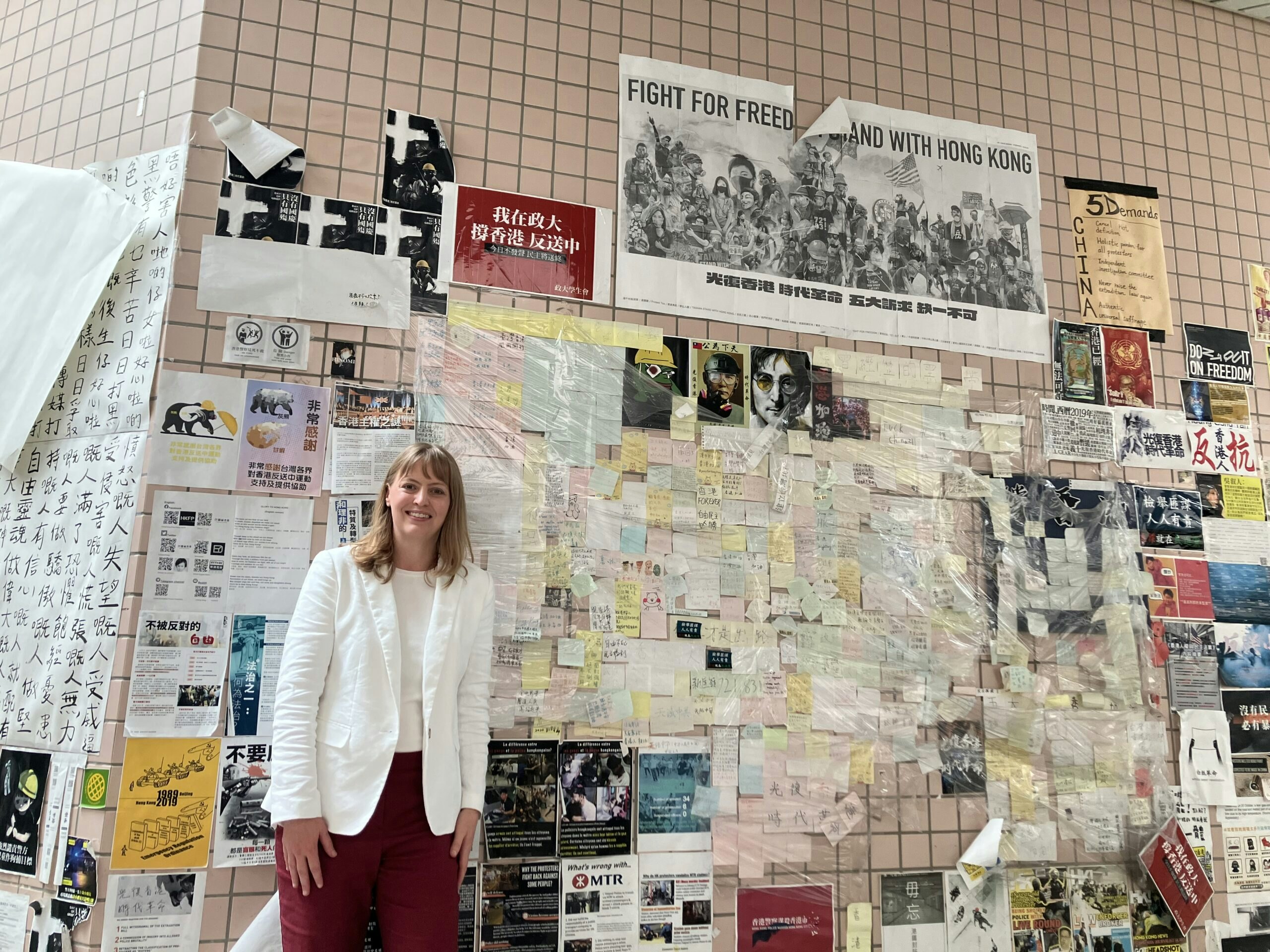Today marks 15 years since Mrs. Laura Bush delivered her historic President’s weekly radio address – a first for a First Lady – to direct international attention to the Taliban’s oppression of women.
As First Lady, she made three trips to Afghanistan, and for more than a decade, she has led efforts through the U.S.-Afghan Women’s Council to protect the hard-earned rights of women in that country. She wrote the forward for the Bush Institute’s latest book, We Are Afghan Women: Voices of Hope, published earlier this year.
The Bush Institute recently spoke with Mrs. Bush about the 15th anniversary of her momentous radio address, the gains made by Afghan women, the challenges that remain, and her hope for the future of Afghanistan.
You have been a resolute advocate for Afghan women, becoming the first First Lady to deliver the Presidential Radio Address on November 17, 2001. Why was it important to you to deliver that message?
After September 11th, when the spotlight turned toward Afghanistan, Americans were horrified to learn of the brutal treatment of Afghan women. Women were shuttered in their homes, forbidden to go outside. They were punished for laughing. Girls were forbidden to attend school. I wanted Americans to know the circumstances of the lives of Afghan women. And I hoped that Americans would help.
On the afternoon I recorded the address, when I put on the headphones and leaned over the microphone, I thought about the millions of Afghan women who had been hidden away from the world, and had the world hidden from them.
In 2002, President Bush and then Interim-President Karzai established the U.S.-Afghan Women’s Council – I am the founding honorary co-chair – to give individual Americans a way to reach out to the women and children of Afghanistan. And many American citizens of many backgrounds began programs to empower the women of Afghanistan. There are now more than 50 members of the U.S.-Afghan Women’s Council, and thousands of Afghan women have been helped by these programs. Now, the First Lady of Afghanistan, Mrs. Rula Ghani, serves as the Afghan Honorary Chair.
Earlier this year, you contributed the forward to the book, We are Afghan Women: Voices of Hope. Can you tell us more about the book and the women featured in it?
I have always been impressed by the determination of Afghan women to change their lives and their country. They hope for a better future, if not for themselves, then at least for their children. I’ve met women from Afghanistan who implored me and all Americans to be patient, to stay with them, and to not forget them.

At a meeting at the White House with a group of Afghan women in 2008, one woman said, “This is our only hope, if we don’t succeed now, we never will.”
When President Bush and I returned to our home in Dallas, we started the Afghan Women’s Project at the Bush Institute to continue our support, and We Are Afghan Women is an important part of our work.
We Are Afghan Women: Voices of Hope shares the inspiring stories of 28 Afghan women and one young Afghan man who, despite enormous challenges, have achieved hard-won progress and success, and who are working to make the lives of all Afghans better. The fact that these stories are told by 28 women, women whose voices were silenced just 15 years ago, shows the progress that’s being made in Afghanistan. The book presents a portrait of Afghanistan today, the tumult the nation has endured throughout the past 40 years, and the accomplishments of its women and their hopes for the future.
The chapters include a story of the “Beekeeper,” a woman who worked in secret as a beekeeper, traditionally a male job in Afghanistan, during the Taliban years. Like her queen bee, she believed she could never take flight. But today she’s found the freedom to take flight and she trains other women in the art of beekeeping.
There’s also the story of Razia Jan, who built a school for Afghan girls. She cleverly taught her young female students to write their fathers’ names first, rather than their own names. Her tactic instilled pride in these girls’ fathers, who couldn’t read or write themselves, and who then gave their daughters permission to continue their education.
These are just two of the stories of survival and strength that Afghan women share in the book. Their powerful voices tell an important story that does not make the headlines. But it is a story that matters.
In your view, what progress has been made over the years, and what remains to be done?
There is good news for women in Afghanistan. Enrollment of girls in primary school has increased from just 5,000 under the Taliban to nearly 2.5 million girls in school today. More than 120,000 girls have graduated from secondary school. And in 2014, the American University of Afghanistan’s valedictorian was a woman, Onaba Payab.
Women play a vital role in the economy. In 2002, few businesses were owned by women. Today, there are over 3,000 women-owned businesses. And, women hold important positions in local and national government, with 69 women currently holding seats in parliament.
While much has changed, there is still work to be done to restore Afghanistan to the peaceful country it once was. For Afghanistan to become a fully inclusive society, women’s rights must be protected and expanded. The successes for Afghan women are real, but so are the challenges. Serious threats remain for women and children there. The stakes are high now that both the Taliban and ISIS are operating in the country. Afghanistan needs the continued support of the United States and international community to ensure that the hard-won progress and sacrifices are secured.
Speaking of continued support, what can – and should – Americans and the international community do for Afghanistan?
I welcome President Obama’s decision to maintain a U.S. military presence in Afghanistan through 2016 and beyond. We know, and the Afghan people know, that we will not have troops in Afghanistan forever, but the country remains fragile, and the cost of leaving Afghanistan is too high.
What happens elsewhere in the world matters here at home. Our continued engagement in Afghanistan is crucial. We need to ensure that Afghanistan will never again become a launching pad for attacks against the United States or ruled by the Taliban or ISIS. This requires assistance to Afghan security forces.
Significant development assistance is also necessary to ensure the advancement of Afghan women, to strengthen health care for all Afghan citizens, to grow entrepreneurship, and to rebuild the educational system. These are all needed for a stable and successful Afghanistan.
As individuals, we can support the great organizations working on the ground. The U.S.-Afghan Women’s Council projects are effective and their work deserves our support. You can find their projects on bushcenter.org. And we should share the stories of courage and resiliency to help spotlight the struggles and successes of Afghan women.
It’s been 15 years since your radio address directing international attention to the Taliban’s oppression of women. Since then, we’ve seen tremendous progress, yet challenges remain. What are your hopes for women in Afghanistan 15 years from now?
My hope is that Afghan women, and women around the world, will live peaceful, prosperous lives. And that their children will have access to education and health care. What I hope for Afghan women is what I hope for myself, or any other mother, daughter, or grandmother. The choices we make will shape the world for the next generation. And that is why it’s important to commit ourselves to addressing the inequities that still affect women today.
The latest chapters of Afghanistan’s history are still being written. Peace has been elusive. Our men and women in uniform have given much on behalf of their freedom. Four decades of civil war and terrorism has left a country that is unstable and needs rebuilding. Democracy and transition is hard and it takes a long time. Let’s stand with Afghanistan and not abandon the people there.
As Mrs. Ghani told me last year, Afghans do not want our pity for their troubles. They want to be the solution. When you read the stories in We Are Afghan Women, you’ll see that Afghan women aren’t asking us to solve their problems, they want us to remain engaged so they can have the space of security to create their own solutions. As one young Afghan woman says in the book, “I have the option to be optimistic or pessimistic, and my choice is to be optimistic.”




























